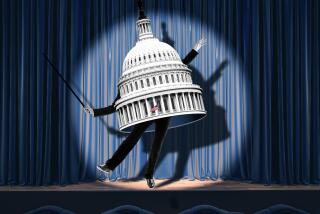House Proposes Tighter Rules on Arts Funding
- Share via
A new effort to resolve a dispute over federal funding of controversial art works was gingerly developed Thursday when a House committee instructed the National Endowment for the Arts and National Endowment for the Humanities to alter procedures for approving grants to artists, authors and scholars.
The changes would require express approval by the Washington headquarters of both endowments of grants that previously could be made by intermediary organizations that receive blocks of money from the two federal agencies and parcel it out to individual recipients.
The alteration of procedure--called for in a report of the House Appropriations Committee adopted Thursday morning--could have the effect of increasing bureaucratic review of arts and humanities fund requests by individuals and organizations. Artists, authors and scholars could face longer delays in processing their applications as a result.
But the report, drafted by Rep. Sidney Yates (D-Ill.), was intended to avert a larger crisis for the arts endowment brought on by conservative members of Congress demanding ironclad guarantees that the agency withhold financial support to any artwork that could be considered offensive on religious or sexual grounds.
Some observers have charged the conservatives, led by Sen. Jesse Helms (R-N.C.), with trying to censor works they find objectionable.
The debate has developed over arts endowment funding of two controversial projects, a traveling show in which a photographer included an image of a crucifix immersed in urine and an exhibition of work by the late photographer Robert Mapplethorpe, whose pictures often include homoerotic and sexually explicit images.
In the Thursday report, the House committee also recommended a $2.3-million increase in the budget of the National Endowment for the Arts, to a total next year of $171.4 million, and a hike of $8.3 million for the National Endowment for the Humanities, to a total of $161.4 million. Appropriations for both agencies are scheduled for House floor action July 12.
The final wording of the report represented a backing away by Yates from a statement last week in which he said he would introduce legislation to prohibit the arts endowment from channeling grant money through intermediaries. The report adopted Thursday is a statement of congressional intent but is not legally binding.
Hugh Southern, the NEA’s acting chairman, called the proposed procedural changes “reasonable and fair.” Southern said the national endowment is “eager to continue working with the committee to ensure that our procedures are effective and accountable.”
The added layer of bureaucracy is intended, Yates said, to decrease the chance that potentially controversial work can be funded without the endowments’ managers being aware of it. Yates said it was uncertain whether the new requirements would have prevented the incident that initiated the current controversy--in which a North Carolina arts agency included the crucifix image by photographer Andres Serrano.
“Somebody might have picked it out as being the degradation of a sacred religious object,” Yates said of the potential effect of the added Washington grant review. “They might have tried to stop it. I don’t know. I do know that it (funding of the show that included the picture of a crucifix in urine) certainly happened under the old procedures.”
Yates said he had discussed the wording and potential effects of the report requirements with Rep. Dick Armey (R-Tex.), leader of the House protest movement over the arts endowment. Yates said that although Armey described the new requirement as “constructive,” he made no commitment to discontinue his crusade against the arts endowment.
A spokesman for Armey confirmed later Thursday that the representative believes the step by Yates is “constructive,” but the spokesman said Armey believes “there is a problem” and “we still have a way to go in addressing a solution.”
Armey has demanded ironclad guarantees that the agency will refrain from supporting any art work that “would be blatantly offensive to the vast majority of the American people.” Earlier, he said he would take a catalogue of Mapplethorpe onto the floor of the House when the arts endowment budget comes up for a final vote.
More to Read
The biggest entertainment stories
Get our big stories about Hollywood, film, television, music, arts, culture and more right in your inbox as soon as they publish.
You may occasionally receive promotional content from the Los Angeles Times.










